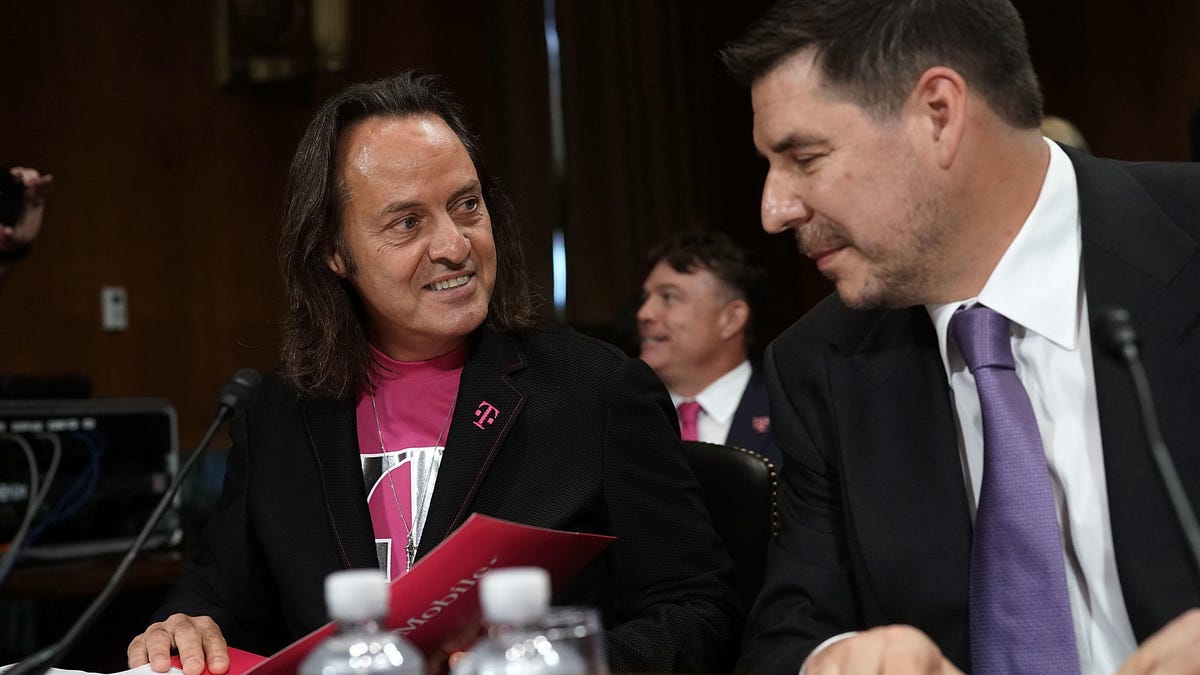T-Mobile and Sprint execs to defend merger on Capitol Hill
Lawmakers are expected to focus on consumer pricing, competition and jobs, but they may also ask about national security concerns.

T-Mobile CEO John Legere (left) and Sprint Executive Chairman Marcelo Claure will head back to Capitol Hill next month.
T-Mobile and Sprint executives are headed back to Washington, DC, next month to defend their planned $26 billion merger, as Democrats in the House of Representatives scrutinize the deal.
T-Mobile CEO John Legere and Sprint Executive Chairman Marcelo Claure have agreed to testify on Feb. 13 in a joint hearing before the House Energy and Commerce Committee and the House Judiciary Committee.
The execs will likely be asked questions about how the merger will affect consumer pricing and competition in the wireless market, as well as about the companies' involvement with Huawei. The Chinese telecom gear maker was indicted Monday on 23 charges for allegedly stealing trade secrets from T-Mobile and committing bank fraud by violating sanctions against doing business with Iran.
"A merger between T-Mobile and Sprint would combine two of the four largest wireless carriers and the carriers with the largest numbers of low-income customers," the committee heads said in a press release. The committees have oversight over the Federal Communications Commission and the Department of Justice, which must both sign off on the merger.
Then there are the lingering security concerns, which are likely to be addressed during the hearing. A group of foreign policy and national security professionals concerned about Chinese infiltration of US computer networks issued a statement asking regulators to take a closer look at the deal in light of the criminal case against Huawei. The group known as Protect America's Wireless noted that while T-Mobile is named as a victim of Huawei's alleged crimes, its parent company the German phone company Deutsche Telekom has continued to partner with Huawei on its 5G deployments around the globe. Sprint's parent, Japan's Softbank, has also deployed Huawei gear in its network.
Security experts are concerned that China may be using Huawei's gear to spy.
US national security officials have pressured Deutsche Telekom and Softbank to rip out their Huawei equipment and to ban the company's products in their 5G network builds. But it's unclear what, if any, concessions have been made to win approval for the deal.
In December, T-Mobile and Sprint announced that the Committee on Foreign Investment in the US (CFIUS) had greenlighted their transaction. The DOJ, Department of Homeland Security and Department of Defense also submitted a filing with the FCC stating they had no objections to the merger. These agencies also withdrew their request to defer action on the transaction, according to the press release from the companies.
Still, security experts say, the criminal filing against Huawei should factor into regulators' review of the deal. And they expect lawmakers to question executives on the matter.
"This week's indictments charge Huawei with serious crimes and demand a fresh look at the national security concerns at the center of the proposed T-Mobile/Sprint mega-merger," David Wade, former chief of staff at the State Department and former chief of staff to the chairman of the Senate Foreign Relations Committee, said in a statement for the group.
He added, "Sprint, T-Mobile, Deutsche Telekom, and SoftBank must abandon the use of Huawei equipment in the United States and around the world. This issue demands much greater scrutiny, and we need it now."
All of this comes as regulators at the FCC, which had been furloughed as part of the partial government shutdown, return to work this week and pick up their review of the deal, which was announced in April.
Critics of the merger say reducing the number of national players will result in higher prices, fewer choices and less flexibility in switching carriers. They point to the competitive pricing and promotions that both T-Mobile and Sprint have offered in the market, which have pressured AT&T and Verizon to lower prices and ditch contracts.
Legere and Claure testified last year before the Senate Judiciary Committee that the deal was important to ensure US dominance in 5G, the next generation of wireless technology that will not only increase network speeds, but also improve the responsiveness of the network, paving the way for new services like streaming VR and self-driving cars.
While Congress doesn't have the power to approve or deny mergers, it does have oversight over the FCC and the Department of Justice, which review mergers.
Democrats on the Senate Commerce Committee have also called for a hearing on the merger. In a letter last week addressed to Republican leadership, Sens. Ed Markey of Massachusetts, Amy Klobuchar of Minnesota, Tom Udall of New Mexico, Tammy Baldwin of Wisconsin and Richard Blumenthal of Connecticut said that a "reduction in competition raises a number of important questions that the committee should address."
Ranking wireless networks: Verizon dethrones T-Mobile, according to OpenSignal.
CNET en Español: Get all your tech news and reviews in Spanish.

